

Ten Steps to Better Student Engagement. Tristan de Frondeville As a teacher, my goal was to go home at the end of each day with more energy than I had at the beginning of the day.
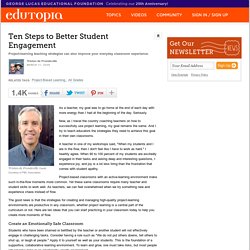
Seriously. Now, as I travel the country coaching teachers on how to successfully use project learning, my goal remains the same. And I try to teach educators the strategies they need to achieve this goal in their own classrooms. A teacher in one of my workshops said, "When my students and I are in the flow, then I don't feel like I have to work as hard. " Project-based classrooms with an active-learning environment make such in-the-flow moments more common. The good news is that the strategies for creating and managing high-quality project-learning environments are productive in any classroom, whether project learning is a central part of the curriculum or not. Create an Emotionally Safe Classroom Students who have been shamed or belittled by the teacher or another student will not effectively engage in challenging tasks.
Cultivate Your Engagement Meter. Influence uncovered - insights on sparking conversations and building engagement - Aurora. Gravity7: Social Interaction Design By Adrian Chan - Aurora. A lot of folks in social media have had their interest piqued by social games and so-called gamification of online practices.
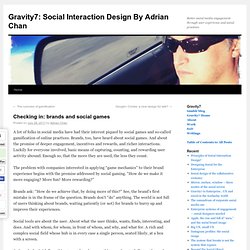
Brands, too, have heard about social games. And about the promise of deeper engagement, incentives and rewards, and richer interactions. Luckily for everyone involved, basic means of capturing, counting, and rewarding user activity abound. Enough so, that the more they are used, the less they count. The problem with companies interested in applying “game mechanics” to their brand experience begins with the premise addressed by social gaming.
Brands ask: “How do we achieve that, by doing more of this?” Social tools are about the user. So brands don’t “do” anything to reach and engage this user. 11 Social Media Personality Types You Didn't Know Exist - Aurora. There are Billions of people who use the Internet every single day.

According to Adrian Chan these Billions of people can be categorized into 11 personality types based off of their online social habits. From Lurker to Creator, or Rebel to Harmonizer everyone contributes to the Internet in their own unique way. 1. Status Seeker: These people tend to be more concerned with their number of followers/friends than most, and are constantly checking theirs and others online stats. They tend to avoid deep conversations. 2. Casual Connect Seattle - Aurora.
Paris-born, serial web entrepreneur Mathieu Nouzareth is CEO of FreshPlanet, the New York-based developer of the highly-popular social mobile game SongPop, the turn-by-turn, simulated real-time play game for music lovers that has built a global following of over 80 Million, players since its launch in June 2012.
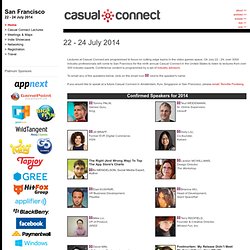
Mathieu Nouzareth began his career in 1995 at 23 by co-founding WebConcept, one of France’s first e-business consulting firms. WebConcept was sold to Sweden’s IconMedialab of Sweden in 1999, and is one the largest internet consultancy companies in the world. From 1999 to 2001, Mathieu acted as CEO of IconMedialab France. In 2001, Mathieu and his brother Romain started Boonty.com, a digital game distribution company. Operating in over 30 countries with a staff of 180, the company was sold to Nexway (France) in 2008 and is currently one of the world’s leading game distribution platforms. The Sunday Parody: World of Gamification. The Daedalus Project: A Model of Player Motivations - Aurora.
The current data set revealed 10 factors that then neatly factored into 3 overarching factors.
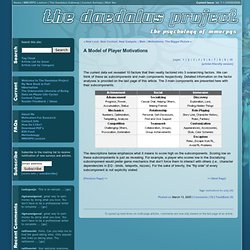
We can think of these as subcomponents and main components respectively. Detailed information on the factor analyses is provided on the last page of this article. The 3 main components are presented here with their subcomponents. The descriptions below emphasize what it means to score high on the subcomponents. Game Player Motivations - Aurora. I included a simple way to break down the major categories of motivation for any game in my recent book, Game On.
This can help you think about the different things that motivate players in almost any game: My goal with the four quadrants of player motivation draw upon prior work by Richard Bartle . Bartle broke player motivations down into explorers, socializers, killers and achievers. Subsequently, he expanded this into eight categories. Nick Yee also developed his own version of player motivations, based on his MMORPG research, identifying three major categories that split into ten subcategories of motivation. My goal is to provide everyone with a new model of player motivations that have the simplicity of Bartle’s original formulation, yet which can apply to nearly any game that exists–not simply MUDs or MMORPGs. Market Research for Strategic Business Decisions, Information Solutions Group, ISG - Aurora. Motivate. Play. - Aurora. As a reader of MP, there's a decent chance that you're already familiar with the concept of "flow" championed by positive psychologist Mihaly Csikszentmihalyi (pronounced like this, not this).
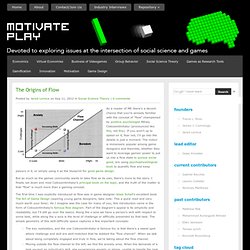
If you aren't up to speed on it, fear not; I'll go into the details in just a moment. The notion is immensely popular among game designers and theorists, whether they want to leverage games' power to put us into a flow state to pursue social good, are using psychophysiological tools to quantify flow and keep players in it, or simply using it as the blueprint for good game design. But as much as the games community wants to take flow as its own, there's more to the story. I finally sat down and read Csikszentmihalyi's principal book on the topic, and the truth of the matter is that "flow" is much more than a gaming concept. A blog of theory and practice regarding motivation, other aspects of cognition, and games - Aurora.